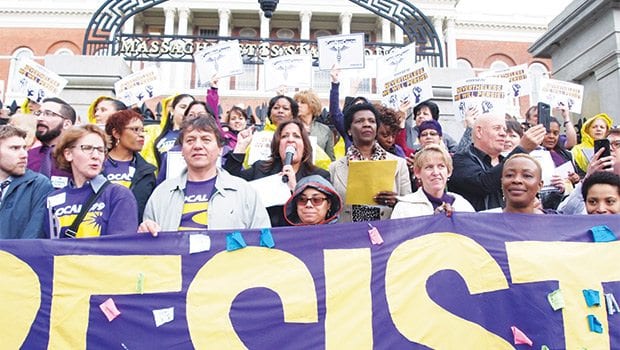Unions mobilize national, local networks against Trump
SEIU members call for vigilance on federal policy that impacts workers’ quality of life

Members of several SEIU chapters turned out on the State House steps last week to rally with Congresswoman Katherine Clark. Speakers called for residents to stay attentive to policy emerging from the Trump administration and be ready to rise in response.
“Labor has always been at the center in this country for fighting for justice,” Rep. Clark told demonstrators.
Roxana Rivera, vice president of 32BJ SEIU, and other union members made clear that they view President Donald Trump’s agenda as a threat to working families and the middle class. Rivera noted that Trump advocates tax cuts for the wealthy and installs corporate billionaires into powerful public positions while pushing policy that threatens workers’ access to health care, workplace protections and life stability, via attacks on the Affordable Care Act, industry regulations and immigrants.
“Trump’s agenda has a clear purpose — to consolidate power for the one percent,” Rivera said.
National action
The Trump administration has sparked counteraction from unions, including state-level policy advocacy as well as work to mobilize nationwide networks.
“Despite attempts to advance an extreme and divisive federal agenda that hurts working families, workers across Massachusetts are uniting with our allies to ensure the Commonwealth continues to lead the nation on affordable healthcare coverage, inclusion and economic justice,” Rivera said.
Nikko Mendoza is the communications director of 1199SEIU, which represents health care workers. Maintaining Medicaid support and the Affordable Care Act are among her group’s top priorities. Mendoza told the Banner that with many of Massachusetts SEIU members and congressional representatives in agreement on these issues, union members instead have organized to push for action in other states. SEIU members partnered with like-minded local organizations to make phone calls to voters in congressional districts across the U.S. that are represented by moderate Republicans. Callers discuss their concerns on Medicaid and health care with these voters, and use a phone system that can patch voters directly through to their member of congress, should they be willing to speak to their representative.
1199SEIU members first tested this strategy with voters in Maine, where they connected them to U.S. Sen. Susan Collins. A moderate Republican, Collins voted in January in favor of initating Affordable Care Act repeal, while supporting protections against cuts to Social Security, Medicare and Medicaid. In March 2017, Collins came out in opposition to the Republican’s replacement bill. More recently, 1199SEIU members have been calling voters in Pennsylvania’s swing congressional district, Mendoza said.
Anestien Bentick, an 1199SEIU member and a lead medical assistant at South Boston Community Health Center, told protestors that earlier this year, SEIU members reached out to families and friends, then phoned members of Congress to ask for action to preserve the ACA. Bentick pointed to the failure of the Trump administration’s bid to repeal the ACA as evidence of the power of individuals working together.
“We showed that when the power of collective action comes together, what we can do,” Bentick said. But, she cautioned, that bid to change health care was only the first, and activists must remain vigilant.
The national SEIU also has been targeting advertising and messaging at key state, Mendoza said. Still, SEIU’s primary focus has been on the local level. These local efforts include encouraging residents to attend community meetings and town hall forums as well as reach out to their legislative representatives and social contacts.
Local priorities
On the state level, Massachusetts’ SEIU members are pushing an array of bills, including a $15 minimum wage for private sector human services workers, passage of the Safe Communities Act, home care industry regulation and criminal justice reforms that include the elimination of mandatory minimum sentences for nonviolent drug offenses.
Another bill is intended to reduce the monetary barrier to political participation by allowing small payroll deductions to be directed into donations to social welfare nonprofit organizations and PACs. Further measures include taxing endowments of private nonprofit higher education institutions and using the revenue to subsidize higher education, early education and child care for low-income and middle-class residents and a bill that requires large physician organizations to contribute financial support to community and safety net hospitals.






